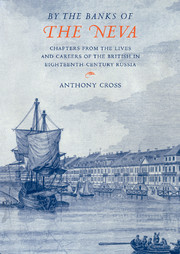 'By the Banks of the Neva'
'By the Banks of the Neva' Book contents
- Frontmatter
- Contents
- List of illustrations
- Preface
- Note on Russian dates
- Introduction
- 1 The colony by the banks of the Neva
- 2 Factory matters and ‘the honourable of the Earth’
- 3 ‘In Anglorum templo’: the English Church and its chaplains
- 4 ‘Doctors are scarce and generally Scotch’
- 5 ‘Sur le pied anglais’: shipbuilders and officers in the Russian navy
- 6 ‘Necessary foreigners’: specialists and craftsmen in Russian service
- 7 Masters of the Arts
- 8 ‘Out of curiosity’: tourists and visitors
- Epilogue
- Notes
- Index
6 - ‘Necessary foreigners’: specialists and craftsmen in Russian service
Published online by Cambridge University Press: 15 December 2009
- Frontmatter
- Contents
- List of illustrations
- Preface
- Note on Russian dates
- Introduction
- 1 The colony by the banks of the Neva
- 2 Factory matters and ‘the honourable of the Earth’
- 3 ‘In Anglorum templo’: the English Church and its chaplains
- 4 ‘Doctors are scarce and generally Scotch’
- 5 ‘Sur le pied anglais’: shipbuilders and officers in the Russian navy
- 6 ‘Necessary foreigners’: specialists and craftsmen in Russian service
- 7 Masters of the Arts
- 8 ‘Out of curiosity’: tourists and visitors
- Epilogue
- Notes
- Index
Summary
In the report of the embassy, sent by the first of the Romanovs (Tsar Mikhail Fedorovich) to England in 1613–14, it is said that the ambassadors told Sir John Merrick, the experienced merchant-diplomat, that ‘you know how in the past under our Great Sovereigns the Tsars of Russia many willing people from other states and from England, doctors and smiths and many learned necessary artisans, knowing about the Moscow state, that it is abundant in everything and hearing of the Tsar's grace, came by themselves and were in honour and sufficiency and earned a great deal’. They continued, in accordance with their instructions, that the tsar ‘wants also to see in his country necessary foreigners, and wants to show his Tsar's grace to them more than before’. The Time of Troubles had severely disrupted commercial, cultural and diplomatic ties between Russia and the West in general and Britain in particular. During the second half of the sixteenth century Russia had seen the arrival from Britain of merchants and diplomats, physicians and soldiers, and a few specialists in other areas. In 1567, for instance, Queen Elizabeth had sent as a result of a request from Ivan IV a goldsmith by the name of Thomas Green and a building and fortifications expert, Humphrey Locke. Ironically, it was silversmiths – a group of whom Boris Godunov had sent back to England in 1602 because he had, he said, a superfluity of them – that Tsar Mikhail specifically requested.
- Type
- Chapter
- Information
- 'By the Banks of the Neva'Chapters from the Lives and Careers of the British in Eighteenth-Century Russia, pp. 224 - 261Publisher: Cambridge University PressPrint publication year: 1996


